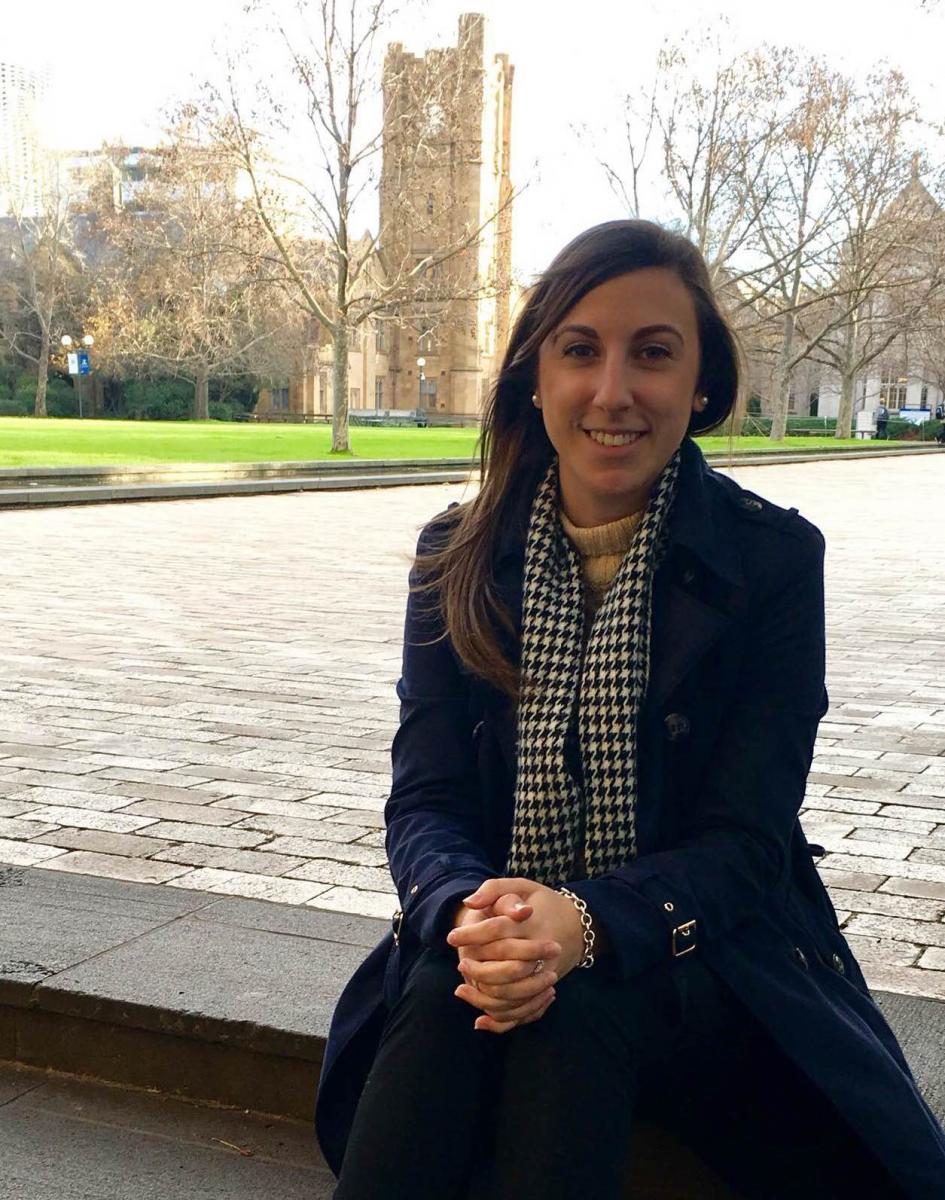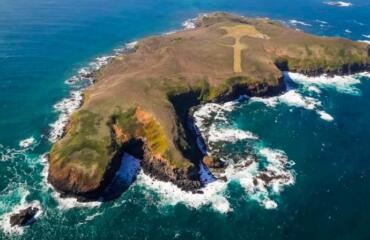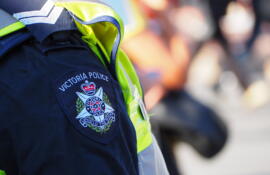
Instructor Warren Johnston sets the scene for participants in the hostile environments training course at Melbourne University’s Dookie campus. PIC: RedR
In 2011, a Melbourne University PhD student undertaking field research in a remote part of Papua New Guinea was attacked and sexually assaulted by a local tribesman, and her boyfriend hit in the chest and abdomen by five arrows. The couple were flown to Cairns for urgent medical attention and were lucky to survive their ordeal, but the student ended up abandoning her research in PNG.
The incident got academic Scott Flower, who at the time was also conducting research in Port Moresby, thinking. “How the hell do tens and thousands of researchers travel across the world without any training?”
Fieldwork is often conducted outside the comfort zone of a researcher’s home country. It can be arduous, with myriad challenges posed by the complexities of an unfamiliar environment.
Yet, says Dr Flower, most students do not get adequate training before venturing out.
“All they get is a document that says you must read the Department of Foreign Affairs and Trade’s travel advice,” he says.

But the stakes can be high. A University of Toronto student was imprisoned for 12 days in Tajikistan in 2014; Australian National University PhD candidate Jacky Sutton, a former BBC journalist, died in suspicious circumstances in Turkey in September last year; while Giulio Regeni, an Italian PhD student at Cambridge, was tortured and killed earlier this year while researching trade unions in Egypt.
“It doesn’t matter what medical insurance or what tracking device you have,” says Dr Flower. “If you are not trained to know how sensitive your research might be and how to protect yourself and your participants’ anonymity . . . you will be at risk.”

Dr Flower, a latecomer to academia, has served in the Australian army, worked as a guide and professional mountain rescue specialist in New Zealand’s Alps, and as an intelligence analyst for the Australian Government. He was keen to use his skills and experience in improving the preparedness of researchers who venture into socially and culturally complex places in poor security environments.
The result was a highly specialised university subject – the first of its kind in the world, he believes – aimed at training researchers on how to better protect themselves in the field.

The eight-day course combines four days of theory with four days of intensive training at Melbourne University’s Dookie campus in country Victoria, where students face a series of tough physical and mental challenges. The subject is run with the help of the not-for-profit RedR Australia, which conducts training courses and provides support to humanitarian organisations and professionals around the world.
Offered since 2014 by the Melbourne Centre for the Study of Higher Education, the subject ranks highly in terms of student feedback.
Professor Hamish Coates says the centre recognised “a massive need” for the training. “These days, when you get off a plane, there are very few places where you can guarantee that someone with a Kalashnikoff won’t be walking down the footpath when you leave that airport.”
He admits that training for PhD researchers in Australia and across the world is “ad hoc”, leaving them often to rely on the resources and skills of their supervisor. The emergence of Dr Flower’s subject – taught twice a year to about 30 students at a time – had been “serendipitous”, and a step in the right direction, he added.
Students who have taken the subject, including journalism and international relations students who see themselves potentially working on foreign soil or simply facing challenging situations while working at home, say it provides grounds for testing their grit in a complex, but safe and supportive, learning environment. Rachel Furolo, a TV news journalist, nominates it as “a definite standout” in her journalism studies.
“Before I did the training I didn’t know how I would react in a serious situation and considered myself more a liability in those situations,” she says. “But it has definitely given me confidence. I got to test myself [on] what it’s like being there – without being there.”
Furolo finds the skills she learnt to be applicable in her current role at WIN TV. “I don’t think there are bombs going off in Ballarat, but I find the negotiating skills that I learnt to be handy in my present job doing vox pops, interviewing people on the road . . . I think if I ever went out to hostile or complex areas as a journalist, these skills would come back.”
RedR Australia, which is funded by the Australian and UK governments, last year trained more than 600 people and deployed more than 120 aid workers to crisis situations in 35 countries.
Its director of operations, Drasko Kraguljac, who has experienced war firsthand during the disintegration of Yugoslavia, reckons no one should venture into volatile environments without a basic understanding of safety and security principles. “The world is very different when you have a gun in front of you, and you don’t have one,” he suggests. “All you have then is your attitude and your negotiating skills.”

That realisation struck documentary filmmaker Steen Rees when working in Africa. “We were very naïve and I made some wrong decisions regarding trip planning,” he concedes.
“We got captured by the Congo security forces who held us for the best part of a day. We survived because we had a local fixer who negotiated our release. When we came back [to Australia], I enrolled in the security and safety training with RedR as a duty of care towards my crew.”
Rees, who has been a trainer with RedR for the last six years, describes the group’s approach as being more useful for journalists than some other safety courses run by ex-military personnel, because of its humanitarian perspective. “Journalists, when they go to disaster areas . . . need to connect with people in those areas.”

The practical component of Melbourne University’s subject aims to “stress out” students “just enough” in a simulated complex and hostile environment. “It’s not a boot camp,” Mr Kraguljac insists. “We run it in a way that the students get to make decisions when they are tired and realise that a lot of these decisions may not be the best ones. If given another chance, they may do it differently.”
This intensive training can involve confronting scenarios that simulate captivity and isolation, which can be enough to tip some students over the edge. Indeed, two students experienced “triggering” of traumatic events from their past during the training.
But Dr Flower sees this as positive. “The reality is we cannot ask students what they have been through [before undertaking the training]. ‘Have you been beaten up before or raped before?’
“But the training is a way to highlight and address these issues with appropriate clinical intervention, especially before they [might] get deployed.”
Dr Flower believes that reporting such events as health and safety incidents had worked out better for the students.
“These days, when you get off a plane, there are very few places where you can guarantee that someone with a Kalashnikoff won’t be walking down the footpath when you leave that airport.” — Prof Hamish Coates, The Melbourne Centre for the Study of Higher Education
“We were able to actually help those students with long-term counselling where in the past those traumatic events [would have] been left untreated. If we had actually approved and sent those students to places such as Nigeria or Rwanda, and if they had experienced something like this, we wouldn’t have been able to help them at all.”
While the off-site training tends to be “in your face”, course co-ordinators are satisfied that they have the right safety nets in place. Two clinical psychologists from the Mandala Foundation are present throughout and hold regular debriefing sessions; follow-up counselling is also offered after the course.
Warren Johnston, a trainer with RedR, says that the course is an eye-opener for many students who have come from a close, protected and civilized environment. “The scenarios make the training real. They are not dreamed up. They have happened to someone, which is what makes them believable.”
Bruno Collier, a former trainer who has previously been a security advisor for NGOs in Afghanistan, agrees that RedR’s training is real and foundational. “Either you get it or you don’t. Five years later something happens and it can come back to you, what you learnt at RedR.”
The training did kick in for filmmaker Rees, who has been arrested four times while on journalism assignments. He says that he was able to negotiate his way out of an arrest when filming in Jordan, purely because of skills he had picked up at RedR. “Journalists are vulnerable to local police forces and military, and arrest is always a possibility.”

Although RedR has specific courses tailored for different groups (for example, a course for women travellers), Mr Kraguljac says that it is not feasible to incorporate self-defence training in a three-day course. Besides, the main emphasis of the training is to help people avoid putting themselves at physical risk in the first place.
Nevertheless, the learning experience that is meant to give students a taste of the travails of a hostile environment can often leave them disoriented, if only temporarily. The four days of physical and mental challenges were enough for Rachel Furolo to experience “a change in the centre of gravity” for a few days.
“I didn’t want to do social media. I withdrew for a few days. And my perspective about things around me changed completely after the training. ‘This all is bullshit’ was how I felt,” she says.
The trainers insist that while students can experience a short-term, post-traumatic effect, the training gives them the ability to put things in perspective when deployed to complex, hostile environments.
Scott Flower’s mission to better prepare researchers and others for hostile environments has gone beyond the university subject that is gaining traction within the academic community. He has also established the Global Centre of Research and Engagement (GCORE) and developed a software application that connects fieldwork researchers across the globe via a satellite tracking system.
The app enables a university to know exactly where its researchers and staff are anywhere in the world to the nearest metre.
The long-term impact of conducting research on the mental health of academics and students has been well documented, with up to one-third of PhD students falling out of love with their PhD in the last year of their research.
Dr Flower suggests that training the researchers better — and keeping better tabs on them — could reduce this attrition rate. “[The premature withdrawal of the students from their Phd] is a huge loss to the university and to the whole world because nothing happens to that hard-earned cutting-edge data collected by the student in the first two years of their research.”
He also points to Australia’s New Colombo Plan, which sponsors undergraduate students to study in the Indo-Pacific, as a potential for trouble.
“Supervisors and the administrative staff [would] get an automatic alert that the individual is back on campus . . . The counsellors can then email Mary Jones: ‘Hi Mary, we understand you have just returned from Nigeria’.” — Scott Flower on a new app to help universities keep tabs on researchers
“Universities have not really thought through the problem of sending large numbers of students with limited life experience or safety skills overseas to unstable or less secure locations without having sufficient knowledge or training to deal with situations they are likely to confront.”
The gap in training for researchers is recognised by Professor Coates, of the Melbourne Centre for the Study of Higher Education: “So you can be left hanging. In fact, there are quiet a few cases where people don’t have supervisors, let alone any broad support, from the institute or the environment. But even if you do have a supervisor, how aware are they of your research environment?”
Shortcomings in the support and training for PhD supervisors is an issue that “deeply concerns” Professor Monica Minnegal, of Melbourne University’s School of Social and Political Sciences, who was the supervisor of the student who was attacked in PNG.
A key reason why her student had survived the attack was because she had been advised correctly and prepared for the risks that she might encounter during fieldwork, according to Prof Minnegal, who has worked in PNG for more than 20 years.
“A lot of students [take up fieldwork research] without any understanding of what they might encounter, which is why I think supervisors and researchers both need to do a course [such as Dr Flower’s].”
Prof Minnegal points to another flaw. “There is no system or process in place to reintegrate students returning from fieldwork. I came back from PNG after a year of research and I felt completely dislocated,” she says.
This experience resonates with Kristine St Pierre, who graduated from a journalism course in Canada a year ago and travelled to Melbourne this year to attend Dr Flower’s course in Dookie, which, she says, proved cathartic.
Ms St Pierre was in Congo in 2013 on a university assignment when she witnessed bomb blasts around the city of Goma. The rapidly deteriorating situation threatened to derail her research.

She returned to her university with no debriefing or follow up from her supervisor. “[The experience] instilled a fear in me that I hadn’t felt before,” she says. “The training at Dookie put that experience in perspective and helped me understand what I went through.”
Dr Flower agrees that fieldwork experience can be isolating. He says his technology, which integrates satellite and mobile communications, as well as giving protection in the field, could also provide a mechanism to ensure support when they returned.
“Supervisors and the administrative staff [would] get an automatic alert that the individual is back on campus,” he explains. “One of the point of contacts, say student counselling services, would get alerted: ‘Mary Jones just returned from her trip overseas’. The counsellors can then email Mary Jones: ‘Hi Mary, we understand you have just returned from Nigeria. It’s not compulsory but you are welcome to come and talk with us about your experiences and how you are readjusting to life back home’.”
Dr Flower launched GCORE just a year ago and anticipates striking a number of partnerships with universities and other organisations worldwide. He believes that recent changes to UK health and safety laws open the possibility of criminal charges in cases where students and staff come to grief overseas, further highlighting the risks of inadequate training for universities.
The shift could be a game-changer. “I am hopeful that Australia will soon follow suit.”



